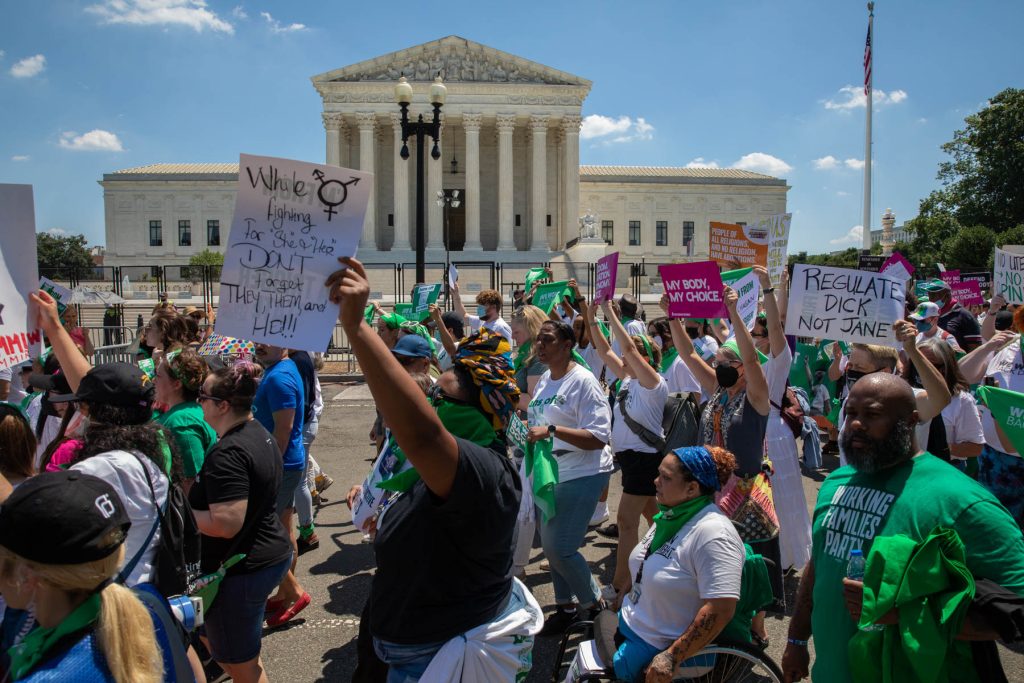The New Mexico Legislature will debate its first two pieces of reproductive health care bills since the fall of Roe v. Wade last summer. One is designed to protect privacy and the other is intended to prevent municipalities and counties from placing local prohibitions on abortion care.
The one that could bring the most controversy is the Reproductive Health Care Freedom Act, sponsored by state House Rep. Linda Serrato and state Sen. Linda Lopez, both Democrats from Albuquerque. Serrato told NM Political Report that this bill was not crafted in response to the ordinances some New Mexico municipalities have considered or passed in some rural parts of the state. She said individuals within the reproductive health community were able to anticipate those actions ahead of time and were already talking about the bill before Clovis held a special city council meeting in mid-October to consider an ordinance that would have given the city council authority to deny an abortion clinic a license to practice within the city limits.
The ordinances prohibit abortion medication to be sent through the mail even though the U.S. Federal Drug Administration approved earlier this month enlarging the availability of abortion medication to more pharmacies, including mail-order companies.
“We’d been discussing it previously,” she told NM Political Report. “You could anticipate what was on the horizon. We need to have equal actions out there. It’s important for the well being for families.”
Clovis did not pass that ordinance that night, but reconsidered the ordinance again in November and a third time in December with hours-long debate each evening. Hobbs considered the same ordinance in November and passed it unanimously.
The Roosevelt County Commission passed a similar anti-abortion ordinance last week on a 4-to-1 vote.
Nadia Cabrera-Mazzeo, an attorney with the American Civil Liberties Union of New Mexico, told NM Political Report that ”sanctuary for the unborn” resolutions that Otero County and Alamogordo passed in July and August do not have enforcement capability.
But the ordinances that require abortion clinics to seek approval for a business license through city councils do, she said.
Serrato said the bill will, if it becomes law, “address those actions” meaning the ordinances, which do have enforcement capability, being taken by some rural municipalities and counties.
Serrato said that with 8 out of 10 maternal deaths being preventable, “we have an outsized number of people dying after giving birth and we need to be preventing that.”
She said individuals across the state should not be “fearful” of their healthcare needs “because of the social ramifications or other ramifications.” She said this bill, if enacted, will “take care of those fears.”
Serrato said it’s important that there is not a “patchwork” of regulations within the state regarding abortion rights.
“The goal is to make sure that we have uniformity across the state and everyone has the same right to abortion care. We do not believe that counties or municipalities should be able to remit an individual’s right to have that care,” she said.
The other bill, the Reproductive Health Care Protection Act, will, if enacted,
put into state statute one of Gov. Michelle Lujan Grisham’s reproductive executive orders made last year. That would protect it from the whims of the next governor Lujan Grisham terms out in 2026. Serrato and Lopez are also the primary sponsors of that bill.
The bill expands upon Lujan Grisham’s order, which protected patients and providers from potential data invasion from out-of-state entities through subpoenas or other legal means. The bill, if enacted, would have enforcement ability, whereas the executive order did not, Serrato said.
Lopez said during a press conference last week that this bill will, if enacted, “hold corporations, nonprofits and governments that share data accountable.”
Kayla Herring, director of public affairs for Planned Parenthood of the Rocky Mountains, said she wasn’t aware of instances of out-of-state entities, whether other state governments or businesses or organizations, trying to access data from Planned Parenthood or other New Mexico abortion providers.
“But it’s of significant concern because of what we’re seeing across the country,” she said.
She said the bill will, if enacted, protect both patients’ data but also providers. Herring said one reason for the bill is that abortion providers are “always the number one target of harassment and violence.”
“As states seek to limit abortion care, we’re keenly aware of states’ overreach in other states,” Herring said.
Herring said one patient this bill would protect, if enacted, could be college students who are from New Mexico but who reside in an anti-abortion state while going to college if the student returns to New Mexico for an abortion.
Serrato also said this bill, if enacted, would protect abortion providers conducting an abortion by prescribing abortion medication through telehealth.
In addition to these two bills, Lujan Grisham has continued to pledge $10 million for what officials with the state are calling a “full spectrum” reproductive health care clinic in southern New Mexico. She mentioned it in her State of the State address on Tuesday.
The money will appear in Lujan Grisham’s capital outlay allocation, Nora Meyers Sackett, Lujan Grisham’s press secretary, said.
Some have referred to the pending reproductive legislation as codifying Roe v. Wade. But Herring said New Mexico is “not going to codify Roe v. Wade.”
“Under Roe, states could limit, restrict, and ban abortion care in ways that put abortion care out of reach for millions around the country. We and our partners dream of a future beyond Roe v. Wade, where communities across New Mexico, and the country, can access the full spectrum of reproductive health care, including abortion care, without political interference or criminalization,” she said via email.
In addition, Herring said the two reproductive health care bills that will be under likely intense scrutiny over the next 60-day session would “function similarly, but not quite the same as a constitutional amendment.”
Some states that lean Democratic have considered adding a constitutional amendment to explicitly state that the citizens of those states have the right to an abortion. While abortion is legal and safe in New Mexico, advocates on both sides of the debate have said that, over time, New Mexico could become a battleground state.
Related: How anti-abortion activists plan to turn New Mexico into an anti-abortion state
Herring emphasized the word “if” when responding and said that if New Mexico does consider a ballot measure that would enshrine abortion as a constitutional right in the state, it would not be considered until the 2024 Legislature.


















